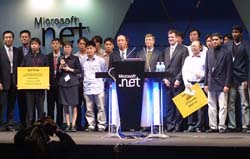
Microsoft Chairman and Chief Software Architect Bill Gates congratulates the winners of the Microsoft Asia Student .NET competition. Click for a larger image. (180dpi)
REDMOND, Wash., Nov. 14, 2001 — Microsoft recently announced the winners of the Microsoft Asia Student .NET competition at the XML Web Services Developers Conference in Seoul, Korea. Winners were awarded their prizes by Microsoft Chairman and Chief Software Architect Bill Gates.
“Education and skills development are crucial to the success of the Asian economy, and it’s impressive to see the enthusiasm and creativity of these students,” Gates said. “We believe that the .NET platform will enable tomorrow’s software developers to create exciting new innovations for customers and greater opportunities for the IT industry.”
Teams from over 300 universities and 11 Asian countries and regions — including Hong Kong, China, India, Philippines, Taiwan, Thailand, Vietnam, Singapore, Indonesia, Malaysia and Korea — participated in the event, each showcasing their programming skills and innovation on the .NET platform, Microsoft’s software platform for the development of XML Web services.
“When I found the information about this contest, I really wanted to participate,” says Hung-Wen Lin, a member of the Taiwan team. “Since we have studied .NET for a while, my classmates and I were eager to build a perfect system and win the game.”
The Taiwan team, consisting of graduate students from National Taiwan University of Science and Technology, was lead by Professor Sin-Min Tsai. The team’s submission, called Personal Information Agent, uses Microsoft Word to enable users to retrieve and edit all the information related to a specific topic on a single page, using XML (eXtensible Markup Language) and Web services.
“At the back end, it stores personal profiles and XML Rules which are used to integrate and reuse information,” explains Po-Chuan Chen.
“Our service provides integrated information,” says Chen-Wei Tsai. “That means you don’t need to manually look for information scattered on the Internet. Our service can integrate article-based or image-based information, discussion forums, and many other types of information into one dataset — or, you can say, on one Web page.”
Final selections were made by a distinguished panel of judges, including: Colin Png, director of .NET and Developer, Microsoft Asia; Professor Francis Lau, Hong Kong University; Professor Zhang Xiong, Beijing University of Aeronautics and Astronautics; Professor Feipei Lai, National Taiwan University; and Woo In Choi, CEO of Devpia, Korea.
“I’m really proud of the Taiwan team and Professor Tsai,” says Wilson Ku, .NET development evangelist at Microsoft Taiwan. “They picked up .NET in a very short time and caught the spirit of .NET. Their project presents not just technical depth, but also actual commercial opportunity.”
The XML Web services submitted by the other three winning teams were: eTravel (Beijing — a Web service that enables consumers to obtain all travel-related information on a single Web page without navigating through multiple Web sites); PointBank .NET XML Web Service (Korea — an integrated point management service that provides PDA/Mobile Shopping and multi-dimensional data analysis service); and Home Automation (Singapore — an XML Web service that enables consumers to control all their home appliances).
The winning team from Beijing University of Aeronautics and Astronautics won a one-week trip to Microsoft’s headquarters in Redmond, Wash.; US$2,500; a $10,000 scholarship toward education costs for team members; five desktop PCs; five laptops, and five Pocket PCs.
“XML Web Service is a truly distributed Web-based technology,” Chen-Wen Tsai says. “It achieves a cross-platform and cross-language object model, and makes the Internet programmable, even among heterogeneous platforms.”
Microsoft plans to make the competition an annual event. Details of next year’s competition will be announced early in 2002, and the competition will be open to university level IT students across Asia.




